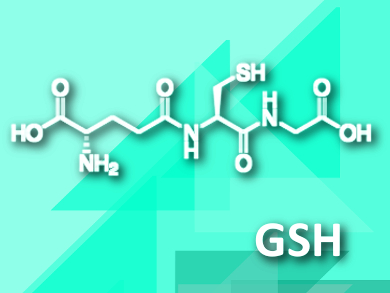Glutathione (GSH) is a tripeptide composed of the amino acids glutamate, cysteine, and glycine. It plays an important role in animals, plants, fungi, and bacteria as a cellular antioxidant. Oxidation of the cysteine residues in two GSH molecules leads to the formation of the dimeric species glutathione disulfide (GSSG, see scheme); the ratio of GSH/GSSG is typically used to measure the level of cellular oxidative stress. This ratio can be altered by a significant number of factors, many of which lead to the development of severe diseases, such as the Wilson’s disease in which Cu(II) is present in blood in excess. However, the exact interactions between Cu(II) and GSH under physiological conditions could not be clarified up to now.
Richard G. Compton, University of Oxford, UK, and coworkers have studied the kinetics and mechanism of the Cu(II)-catalyzed oxidation of GSH under physiological conditions using blood and saliva samples. Prior to the oxidation event and at low GSH or high Cu concentrations a 1:1 complex of Cu/GSH is formed. Interestingly, upon increasing the GSH content (or decreasing Cu), the oxidation of GSH to GSSG is slowed down due to the formation of a 1:2 Cu/GSH complex.
The researchers think that their findings will be beneficial towards the development of new medical sample preparation procedures. For example, in blood samples, the GSH levels quickly decreases upon storage, whereas GSH in saliva samples is much more stable; an effect that may be attributed to different concentrations of Cu(II).
- The Copper(II)-Catalyzed Oxidation of Glutathione,
Kamonwad Ngamchuea, Christopher Batchelor-McAuley, Richard G. Compton,
Chem. Eur. J. 2016.
DOI: 10.1002/chem.201603366




